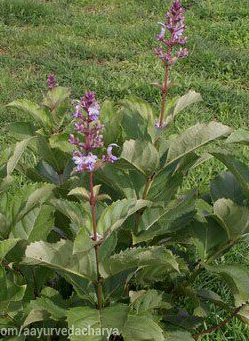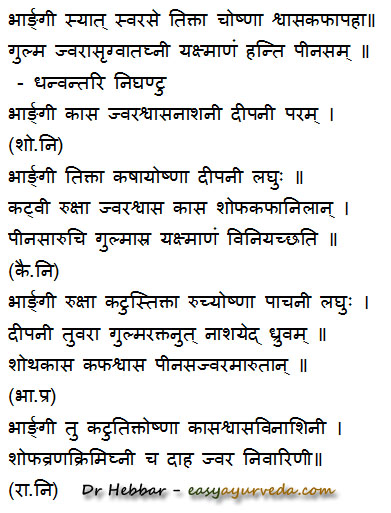Bharangi Clerodendrum serratum Uses, Side Effects, Dose
Bharangi – Clerodendrum serratum is a powerful Ayurvedic herb used in treating allergic rhinitis, asthma, fever and other inflammatory conditions.
Botanical Name- Clerodendrum indicum(Linn) Kutz. (C siphonanthus R. Br. Siphonanthus indica Linn.)
Family- VERBENACEAE (Nirgundi Kula)
Table of Contents
Vernacular names
English name – Turk’s turban moon, Blue glory, Beetle killer
Hindi Name- Babhanaiti
Telugu Name- Guntubharangi
Bengali Name- Bamunhati
Tamil Name- Kavali, Parangipattai, Parangi, Parangi pattai churnam
Marathi& Gujarati Name- Bharangi
Kannada Name- Gontu barangi
Malayalam Name- Kankabharani
Sanskrit Synonyms
Phanji, Hanjika, Bhargi
Brahmanayastika – the stem is very thin
Padma – flower resembles that of lotus
Kharashaka – leaves are dry
Angaravalli – When blossoms appears like red hot coal
Brahmani – Auspicious plant

Classical categorization
Charaka Samhita – Pureesha sangrahaniya – group of herbs that increase bulk of feces.
Sushrutha- Pippalyadi
Ashtanga Sangraha – Pippaylady gana
Ashtanga Hrudaya – Arkadi Gana and Surasadi Gana (Reference: Astanga Hrudayam 15th chapter)
Varieties, distribution
Clerodendrum indicum is considered as Bharngi by Prof P.V Sharma.
Most scholars identify Clerodendrum serratum as Bharangi. It is also called Clerodendron serratum.
Distribution- Found all over the India
Morphology
Stem – Bluntly quadrangular
Leaves – Opposite, big, Elliptic, Acute, Petioles are very stout
Inflorescence – Panicle
Flowers – Numerous, Pedicels twisted, Flowers are bluish to dark purple
Fruit – Drupe
Useful part – Root
Adulterants
Stem part of Clerodendron serratum
Root of clerodendron indicum
Bark of Picrasma quasiodes
Major chemical constituents
Hispidulin, 7-0 glucuronides, Scutellarein, uncinatone, pectolinaigenin etc.
(Reference: Illustrated Dravyaguna Vijnana, Vol. II, by Dr JLN Shastry)
Medicinal Properties
Rasa (taste) – Tikta (bitter), Katu (pungent)
Guna (qualities) – Laghu (lightness) , Rooksha (Dryness)
Vipaka- Katu – Undergoes pungent taste conversion after digestion.
Veerya- Ushna – hot potency
Effect on Tridosha – Balances Kapha and Vata Dosha.
Action – Swasahara, Kasahara, Pachana, Sothahara, Jwaraghna
Part used, Dosage, Side effects
Part used- Root, leaves
Dosage- Powder 3-6 grams in a divided dose per day.
Side effects: There are no known side effects with this herb
Sanskrit verse

Benefits, uses
Clerodendrum serratum – benefits and usage:
Shwasahara – useful in treatment of asthma and chronic respiratory disorders.
kaphapaha – acts as mucolytic, breaks down mucus and eases it out of lungs
Gulmahara – useful in abdominal tumors
Jvarahara – useful in fever
Vatarakta – useful in gout
Yakshmahara – useful in chronic respiratory conditions, tuberculosis
Peenasa hara –useful in rhinitis
Deepani – improves digestion strength
Shophahara – useful in inflammatory conditions
Vranashophahara – useful in abscess, infected wounds, induces quick wound healing
Krimighna – antimicrobial, useful in worm infestation
Dahahara – useful in burning sensation
Its leaves are applied as paste on wounds to extract out pus.
Interaction with medicines, supplements
Can this be used while taking Homeopathic medicine?
Yes. This product does not react with homeopathic medicine.
Can this medicine be continued while taking supplements like multivitamin tablets, Omega 3 fatty acids etc?
Yes. Generally, this product goes well with most dietary supplements. However, if you are taking more than one product per day, please consult your doctor for an opinion.
With western
medicines
Seek your
doctor’s advice if you are taking this product along with other western
(allopathic / modern) medicines. Some Ayurvedic herbs can interact with modern
medicine.
If both Ayurvedic and allopathic medicines are advised together, then it is
best to take Allopathic medicine first, wait for 30 minutes and then take the
Ayurvedic medicine.
Research
Anti-carcinogenic activity of leaf extract
In vitro anti oxidant activity
Ayurvedic medicines
Ayurvedic medicines with Bharangi –
Because of its immense benefit in respiratory tract disorders, it is used in many anti asthma, anti-cough medicines like –
Bharngi Guda, Pushkaramoolasav, Vasavaleha etc.
It is also used in
Ayaskriti – an Alcohol based liquid medicine used in vitiligo, obesity etc
Amritaprasha Ghrita – useful in bleeding disorders, cough, gynecological disorders
Khadiradi Gutika –useful in throat infection, cough – This medicine is used to chew slowly, so that the medicine effect is seen in the throat.
Sthanika karma (Systemic Acton)
Externally – Vrana pachana (expelling pus from the boils / wounds)External application of its leaf paste is beneficial for vranapachana. Also indicated in Gandamala (Cervical Lymphadenopathy)
Internally
Nervous System – Calm down the nervous system. Beneficial in vataja rogas
Digestive system – Carminative, digestive, Facilitate movement of doshas in normal direction. Indicated in anorexia, loss of appetite, abdominal distension etc.
Respiratory System – Pacify kapha dosha. Indicated in Running nose, kasa (Cough), breathing difficulties, Tuberculosis related cough etc. Its root juice along with ginger juice can be administered to prevent asthma attacks.
Circulatory System – Act as a blood purifier. Indicated in generalized edema.
Excretory system – it increases urine production by stimulating the kidney action. indicated in Dysuria
Reproductive system – Stimulate uterine muscles, Aphrodisiac Indicated in Dysmenorrhea
Skin – Stimulates sweat glands.
Tapakrama – Indicated in jvara (Fever), Amapachana.









2 comments on “Bharangi Clerodendrum serratum Uses, Side Effects, Dose”
Rakesh
good& useful information.
Narayan
Parangi Pattai is Madhusnuhi